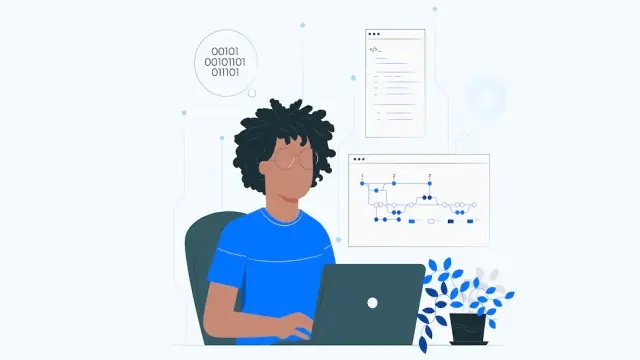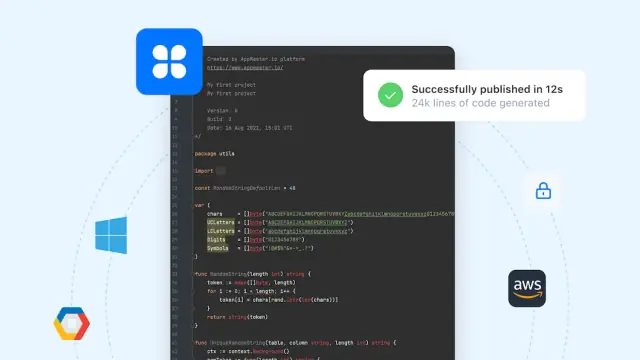Why is Coding Skill Necessary in the Modern World?
Check out our brief on why coding gains popularity in the modern digital world and learn what coding language is best for automation.

The world is changing, and it's something we can all experience. Up to some years ago, we used our phones only to make calls, text our friends, and browse the Internet. Today we're using them to do shopping, pay at stores' checkouts, check in at the airport, and so on.
In their attempt to keep up with the times, all businesses are oriented to innovation, and the main theme - when it comes to innovation - is digital automation. Does it mean that coding is becoming so important that it is now a necessary skill in this new automated world?
In this article, we're answering this question by analyzing what digital innovation means, how important it is becoming in the new automated world, and how coding is becoming a required skill. As we'll see, more than coding, it is programming - the ability to create software - that is becoming essential in today's business world; and how low-code no-code apps can boost innovation. As we're about to see, learning to code is not the only viable route.
What is digital innovation?
Digital innovation is using technology - software and hardware solutions - to improve businesses' workflow and productivity. Automation is a big part of digital innovation: one of the main ways through which you can improve a business team's workflow is by automating as many processes as possible within the production chain. However, automation is also involved in improving the customer's experience, providing new services and products, and also creating new and completely digital business models.
Why is automation's importance increasing?
Digital automation is becoming very important in our everyday experience: in a nutshell, this is the main reason why automation is becoming important and why, as an entrepreneur or a professional, you can't overlook this factor. However, we always like to dig deeper and provide a more detailed analysis: when we look at things carefully, we notice that automation is not only important, it is essential.
During the pandemic, the Web was the only contact they could have with the outer world for many. And it wasn't only a matter of communicating with friends and family: the Internet was the place to go if you needed to follow a course, connect with your work team, browse through running shoes if you need a new pair, order dinner or grocery, and so on. We need to ask ourselves now: have things changed after the pandemic?

It seems they have not: users' experience with businesses - in almost any sector - always starts online. Not only does it start online, but they expect to manage online as many aspects and interactions as possible. When they search where they can buy a takeout dinner online, and they end up on your browser, they'll certainly search for a way of ordering directly from the app or website: they'll call the restaurant only if they won't find an automated way of ordering.
This is just an example, but it's what happens with all customer-business interactions. Businesses need to acknowledge this dynamic and move in the direction of automation.
Has automation any advantage for businesses?
Because of all the aspects we've just seen, automation isn't only important, it is essential for the survival of businesses in every sector. But is it a price businesses need to pay, or do automation and software bring advantages to businesses?
The short answer is that while, yes, businesses keep up with the times' thanks to programming and software, they also become able to exploit many advantages:
- automation increases productivity because many tasks are handled quicker and better;
- automation increase the number of customers you can deal with each day
- software attracts customers because the audience - at the beginning of the '20 - is increasingly used to using it - whether it is a website, a mobile app, or a web application.
With these first two paragraphs, we wanted to discuss the importance of automated software in today's world so that we can now provide a more aware answer to our initial question: is coding a required skill nowadays?
Is coding a required skill nowadays?
If the world is going in the direction of digital innovation and automation, then we must expect coding to become a more and more valuable skill in the workplace. This is something that we can deduce from our previous reflections, but data confirms it: a 2019 report provided by the Bureau Labor of Statistics of the United States affirms that more than half of future jobs will be in computer and information technology and not only in the sectors of computer, but also science, engineering, math and more.
However, not only computer techs are programmers. But of these new jobs, the Bureaus Labor of Statistics also says, 21% of them will be software developers. Let's take another report, this time from 2020. An article published in Forbes that year says that automation is becoming so important that, if you want to have a job in the future, you better learn to code or design a product.
From our discussion and the two reports we've mentioned, we can say that, yes, coding is becoming a required skill in the workplace. Developers have a lot more secure job opportunities, and learning to code is becoming more and more popular among students worldwide.
The demand for programmers is actually so high that we might have expected more and more people to leave their old jobs or careers and start learning to code to find better jobs and enhance their opportunities. However, this is not happening. Learning to code and becoming a traditional programmer isn't still a thing. Why, if the job opportunities are so attractive? Why if coding is such a required skill?
Why is there a lack of programmers?

The fact that there are fewer programmers than the ones that companies are looking for isn't only because of the high demand. If we look deeper, there are other reasons why not everyone searching for a job is becoming a programmer.
Programming courses are expensive
Learning to code can be very expensive. Programmers' courses that prepare you to become a professional developer (not an amateur) can cost between $10,000 and $20,000. Many families can't afford to pay for coding courses for their children, and many students and workers in search of a new career can't afford to spend so much on programming classes.
Programming courses aren't open to all
Programming courses - those that allow you to learn coding from zero to developer level - often accept only a certain number of students each year. For this reason, if you know nothing about programming and coding, it's unlikely that you will be accepted into these schools: this makes it harder for people in search of a new career to actually make this change.
Code learning is time-consuming
Programming courses are often full-time. This is often not a problem for students, but if you have a job or you're running a business, it can become very hard to find the time to follow your programming classes and practice coding. Many people need to leave their old job in order to learn to code, and many people just can't afford that.
Learning to code is hard
Learning code, and learning that type of code that allows you to create automation and automated software isn't easy. Many computer geeks may find it easy, but coding, programming, and creating software isn't for everyone.
Reluctance to start
Because coding is hard, because we know that it isn't for everybody, many people are just reluctant even to begin that code learning path. Furthermore, those who are thinking of changing their career may feel reluctant to start over: they may have their degrees, diplomas, and recognition, and now they have to start from scratch, surrounded by teenagers.
From what we've discussed so far, it may seem that, despite automation and coding being the present and future of the labor market, for many people, it is still impossible to access it, and for others, it is just too late.
However - and this is the most important piece of information we're sharing in this article - coding and programming are evolving in a direction that will allow - and already allows - more and more people in every sector to access coding without learning to code!
How to have the skills without learning to code
The world of coding is very dynamic: it has evolved with new programming languages and integration. The latest update in the world of coding is, however, no-code apps. In the second part of this article, we'll explore what no-code is, how no-code apps work, how it makes automation and new jobs accessible for anyone, and how you can start code learning how to use low-code no-code apps just now!
What is no-code
No-code (low-code) is a quite new approach to coding, programming, and software development. As its definition suggests, no-code (low-code) is a way of coding that doesn't actually code or, at least, it doesn't use programming languages. But how could you code without coding with programming languages?
No-code (and low-code) is only possible with low-code no-code apps. These no-code apps are developing software environments that provide a visual interface and pre-built software elements that users can utilize to create their app or software.
Difference between no-code and low-code
We've mentioned so far no-code on one side and low-code on the other: as you can easily guess, no-code and low-code aren't' the same thing, even though they are similar and often possible within the same platform.
- Low-code is an approach that requires only a little coding. The user, who is the developer, can use the pre-built software elements, but then - to reach the perfect level of integration and guarantee a good user experience, they have to use traditional coding. It means that developers that use the low-code programming approach need to know some programming language.
- Low-code no-code apps are a true revolution because they don't require the user (the user of the low-code no-code app, that is, the developer) to know any programming languages. Low-code no-code apps are so flexible and complete that they allow users to create complete and functioning software, with a premium user experience, without using a single line of coding.
No-code low-code platforms
The best low-code no-code app or software platforms are the ones that allow the user to create apps without using any coding or programming languages, but that provide access to the backend code. In other words, the best no-code low-code software platforms are the ones that can become low-code if any developer wants to access and edit the backend code. Only with this possibility can programmers be completely free and have no limit to their programming experience.
AppMaster is known as one of the best low-code no-code apps in circulation: it provides a visual interface that eases the coding experience and makes it smoother, and it also provides access to the backend code to save, export, or edit it.
Why AppMaster is the most recommended no-code app
By analyzing what makes AppMaster the most recommended no-code app, we hope we can help you understand how to recognize a premium no-code app, one that you can use for creating your own automated processes and one that allows you to become a software programmer.
-
Access to backend code
As we've mentioned, the possibility of editing the code is important to guarantee full control over the software the programmer is creating.
-
Integrations
When the no-code app is well integrated with other apps and platforms, adding functionalities and the coding experience becomes even easier.
-
Easy launch
The best no-code apps also provide tools that help you launch the app you've just created on all the major stores available so that you can easily distribute it to your collaborators or clients.
-
Flexibility
A no-code app shouldn't provide full freedom to software programmers only by giving access to backend code. Even those software programmers who don't want to use programming languages should have zero limitations in their programming experience.

No-code importance in the upcoming labor market
With the no-code low-code approach, not only we're assisting the democratization of tech, but also the democratization of coding, programming, and automation. And that can be a great opportunity in a world where coding is becoming a fundamental skill in the labor market.
The no-code, low-code approach, therefore, isn't only revolutionizing the world of programming software but also the labor market. With no-code low-code, the coding experience becomes easier, and the required skills become more accessible to many.
This doesn't mean, however, that there is no skill to be learned. No-code low-code is still a skill, a required skill if you want to become a programmer or if you want to automate processes within your business, but it's a lot easier to get to the point where:
- you can automate processes for your business, create software that improves the user experience, and create mobile apps for your customers without hiring a software developer (because the demand for programmers is so high, their services are quite expensive);
- become a programmer yourself and begin to sell programming and coding services.
Instead of learning to code, you'll be learning no-code, which is a quicker and easier process.
No-code apps open the doors of the future
Low no-code apps make software programming skills more accessible for everyone. Because, as we've seen so far, software programming skills are among the most required in the present and future workplace, low-code no-code apps can open the key to the future.
Does it mean that traditional software developers will be penalized? Not at all! Low-code, no-code apps are a resource for experienced developers just like they are for beginners. With low-code no-code apps, developers can code faster. Furthermore, low-code no-code apps provide higher control over complex projects.
For experienced software programmers choosing the right low-code no-code apps will become even more important: it is fundamental for them that the low-code no-code app of choice guarantees access to the backend code so that they can use the programming languages they know to personalize their programming software development project.
Conclusion
In the new automated world, coding is a required skill. Low-code, no-code apps provide the best solution to one major problem: the fact that code learning isn't accessible to everybody. No-code apps will provide the possibility to fulfill the growing demand for software developers in the present and future labor market.






